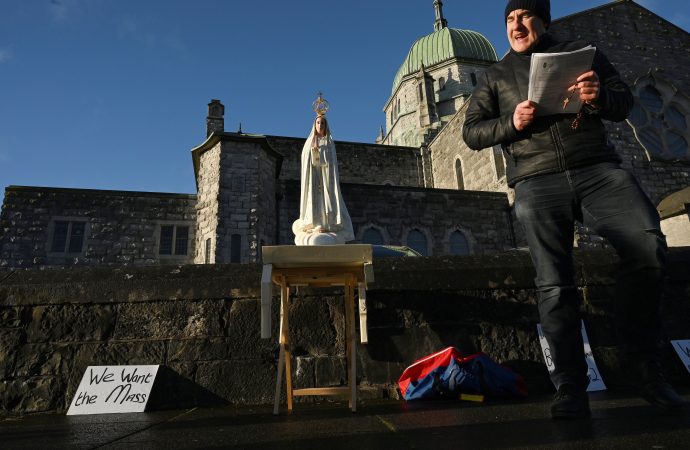Church leaders in Ireland are calling on the government to take the spiritual needs of the population into consideration, noting the country is the only one in Western Europe to continue to ban public worship due to the COVID-19 pandemic.
“I must speak out to represent the voices of a very large cohort of people who are growing increasingly weary of being unable to attend Mass and whose spiritual and mental wellbeing is being eroded. Their patience is wearing thin. They are frustrated and feel unrepresented and discriminated against,” said Bishop Alphonsus Cullinan of Waterford and Lismore.
The Republic of Ireland has been in lockdown since late December, and Masses with a congregation are currently banned. Priests allowing people to attend worship services face fines of over $500.
The Republic of Ireland won’t lift its Level 5 restrictions – a full lockdown with people urged to stay at home – until April 12; however, public worship won’t be allowed until the country reaches Level 2, when many businesses will have already been allowed to reopen. This is expected to happen in May at the earliest.
Northern Ireland’s religious communities voluntarily suspended public worship in January, but resumed public worship on March 26.
“When I celebrate Mass each Sunday in the Cathedral I do so behind closed doors. I am very conscious of those faithful barred from attending and yet within a few steps of our Cathedral, people can go to shops for essential things – to their pharmacy to get medicine, to their supermarket to get food and even to a café for an out-door coffee. Yet they cannot receive Holy Communion in their church which is spacious and can accommodate dozens of people safely,” Cullinan said in a March 31 statement.
“It is very difficult to explain to people why they are banned from public worship bearing in mind also that Ireland is one of the tiny few countries in Europe where public worship is not allowed,” the bishop said.
Cullinan pointed to the fact that priests and volunteers in Ireland have been “very diligent” in making sure churches are kept sanitized and safe for worship. During the Republic of Ireland’s fist lockdown in the Spring of 2020, the Irish bishops’ conference developed extensive guidelines to create COVID-safe environments.
“I do not believe that it is an either/or situation. It is not that we must stop public worship to safeguard physical health. We can do both. We must safeguard people’s health AND support their spiritual wellbeing,” the bishop said.
“I feel that the spiritual well-being of our people has not been given any serious attention by the authorities. To say that ‘services go online’ is very hard to take and feels dismissive. I sympathize with the governmental authorities at this very difficult time, but appeal to them to take into consideration the spiritual care of hundreds of thousands of Catholics and many people of other faiths who wish to exercise their rights as guaranteed by our constitution,” he said.
Meanwhile, Archbishop Dermot Farrell of Dublin touched on the COVID restrictions during his Chrism Mass on Wednesday.
“I will continue to emphasize to Government the importance of the earliest possible return to the public worship, and that the easing of restrictions must not be subordinated to powerful commercial interests, even those considered ‘non-essential.’ There will be further direct engagement with Government to ensure that specific positive consideration is given to public worship by the end of April,” the archbishop said.
“The significant care with which any re-opening of churches for public worship will be approached by Church authorities is well attested. Furthermore, the vulnerability of many of those attending Mass is not lost upon those of us in ministry. My call for easing of restrictions on public worship is based on a fair process for the reopening of society as conditions permit,” he added.
Farrell also said it was a “matter of concern” that COVID-19 infection rate has stayed well above what had been expected in the Republic of Ireland, while the pace of vaccination “has been much slower than promised.”
The Republic of Ireland has been lagging behind the North in vaccinations against the COVID-19 coronavirus. As of March 28, 580,857 people had received a first dose of a COVID-19 vaccine in the Republic, which has a population of 4.9 million. Northern Ireland, with a population of 1.8 million, has vaccinated 740,000.

